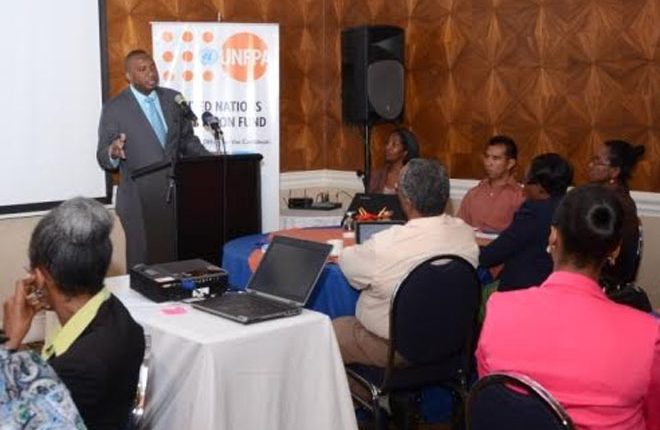Kingston, Jamaica (JIS) — Permanent Secretary in the Ministry of Health, Dr Kevin Harvey, said Jamaica has come a far way in gaining improvements in sexual and reproductive health.
He noted, for example, that total fertility rate has moved from a high of 5.5 per cent in the 1970s to 2.3 per cent currently. In addition, HIV prevalence rate for the general population has been sustained at 1.8 per cent.
Dr Harvey was addressing the opening of a three-day regional reproductive health workshop yesterday (August 11), at the Courtleigh Hotel and Suites in New Kingston.
The workshop, which is geared towards strengthening the promotion of reproductive health commodity security in the Caribbean, is being staged by the Health Ministry in collaboration with the United Nations Population Fund (UNFPA).
Dr Harvey, in welcoming the intervention, said it will undoubtedly improve the capacity of Jamaica’s health team to ensure sustained availability and access to needed reproductive health services, especially among the most vulnerable in the population.
He said there are still a significant number of unplanned pregnancies among Jamaican teenagers and the rate of HIV infections for teenage girls remains a concern.
“This is an important opportunity for continued dialogue and capacity building of our health professionals in this important area of securing and making available and accessible, reproductive health commodities,” he noted.
Dr. Harvey said the Ministry remains committed to working with its international, regional and local partners to achieve the national development goal of a healthy and stable population by 2030.
The workshop is part of the UNFPA’s flagship initiative, Global Programme to Enhance Reproductive Health Commodity Security, which seeks to assist countries build stronger health systems and widen access to a reliable supply of contraceptives and medicines for maternal health.
A 2013/2014 Caribbean study supported by the UNFPA, which sought to examine the contraceptive logistics information system at the regional, parish and service delivery points, found that there were several gaps in the system, including challenges with data management and inadequate staff capacity.
The UNFPA, therefore, partnered with the ministries of health of several countries in the region for a series of interventions.
The three-day regional workshop, which forms part of interventions, will promote capacity development of the health care staff in logistics management, monitoring and evaluation, forecasting, demand generation and procurement.
Representatives from 10 countries were in attendance on the first day, as well as officers from Jamaica’s National Family Planning Board (NFPB).
UNFPA Director for the Sub-Regional Office for the Caribbean, Sheila Roseau, said the organisation is working closely with the ministries to develop an effective strategy to promote reproductive health commodity security.
These strategies, she said, include “advocacy with the governments regarding the need to make greater investments in reproductive health, supporting the integration of HIV and family planning programmes and providing technical inputs into the generation of reproductive health data.”
“A secure, steady and reliable supply of reproductive health commodities has an impact on teenagers who are too young to be mothers, couples seeking to space the births of their children, women whose lives could be saved by medication during childbirth and people in need of protection from HIV and sexually transmitted infections,” Roseau said.

